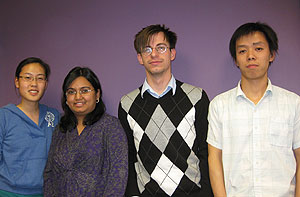REDMOND, Wash. — April 20, 2010 — More people die from cardiovascular disease than from any other cause, and an estimated 4.6 billion people worldwide have mobile phones.

Students from Wayne State University in Detroit who created project LifeCode include (from left) Melissa Hui, Fahima Amin Bhuyan, Steve Markovitch and Kun Wang.
Those two facts are separate but very much related to a group of students at Wayne State University in Detroit who have developed a project named LifeCode, which aims to fight the world’s top killer with the planet’s fastest growing technology.
In LifeCode, mobile phones equipped with biosensors could measure patients’ vital signs, including heart rate, blood pressure and temperature, says Steve Markovitch of Detroit. He and teammates Melissa Hui, Kun Wang and Fahima Amin Bhuyan will compete in this week’s eighth annual U.S. Imagine Cup, a Microsoft-sponsored competition that urges students to use technology to create innovative solutions that can change the world. Regional finals are being held across the world in preparation for a worldwide final that will be held in Poland in July.
LifeCode and the other Imagine Cup teams aim to use technology and their creative ideas to solve some of the world’s toughest social problems as outlined in the United Nations’ Millennium Development Goals.
“In a remote village in a developing country with no nearby hospitals, our hardware and software components could potentially help treat medical problems,” Markovitch says. “LifeCode would send the vital data over a cellular network to where doctors and hospitals could access the data and help treat patients remotely.”

The eighth annual Imagine Cup competition urges students to use technology to create innovative solutions that can change the world.
Mobile cellular subscriptions worldwide reached approximately 4.6 billion in 2009, according to the International Telecommunication Union. Simultaneously, cardiovascular disease—including strokes and heart attacks—is still the No. 1 cause of death worldwide, killing an estimated 17.1 million people in 2004, according to the World Health Organization.
“Cell phones as a technology have spread faster and had a greater impact on the entire world than any other technology, Markovitch says. “They’re even available in small, remote villages now. That availability is very exciting, in terms of being able to use the technology for other purposes.”
Cloud computing is a key component of LifeCode; once the biometric data is transmitted, it can be securely stored in a remote database so that medical professionals can evaluate it. LifeCode can even pinpoint a patient’s location by using the mobile phone’s GPS system to help health-care workers gather even more information.
Markovitch says he and his teammates believe the field of mobile health is “up-and-coming,” especially as the number of mobile phones grows in developing countries. He estimates mobile health will be a $50 billion-a-year industry.
“The increasing industry interest in sensors and other interactive technologies continues to fuel our interest in exploring the correlation of health-care needs and these emerging technologies,” he says.
The team also won an entrepreneurial award from Wayne State University that will provide office space and funding for two team members to work on LifeCode full-time this summer.

LifeCode, a student project for the U.S. Imagine Cup, uses mobile phones with sensors to track vital signs, allowing doctors to remotely treat patients in rural or developing areas.
“By the end of the summer, we’re hoping to have small-scale deployments locally in Detroit and then look into doing a deployment in a developing country or rural population,” Markovitch says. “We plan to turn this into an actual company.”
LifeCode will compete with nine other teams in the U.S. finals. Only one team will win a trip to Warsaw, Poland, for the worldwide Imagine Cup finals in July.
In the run-up to the U.S. finals, each team has prepared a video and is soliciting votes for the People’s Choice Award. Each member of the team with the most votes will receive a Flip camcorder. Teams that place in the Imagine Cup regionally and internationally are also often put in touch with Microsoft recruiters for possible internships.




